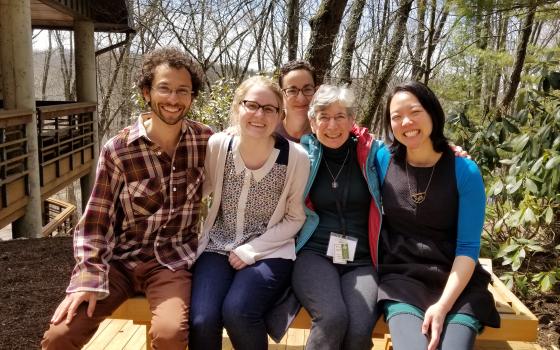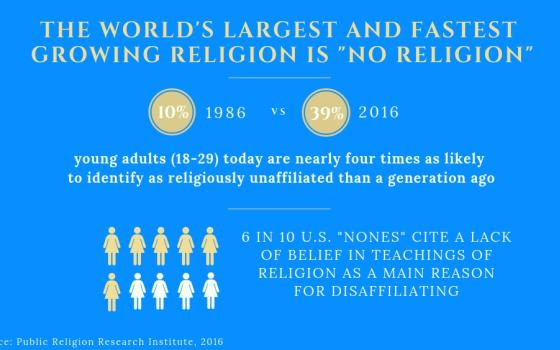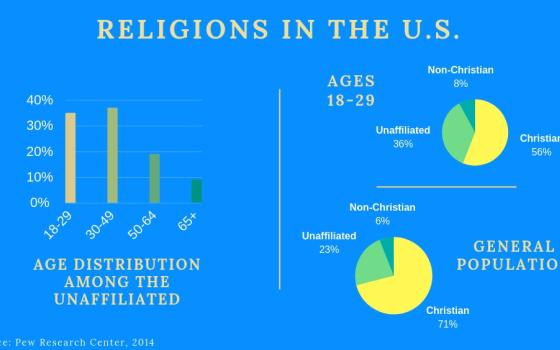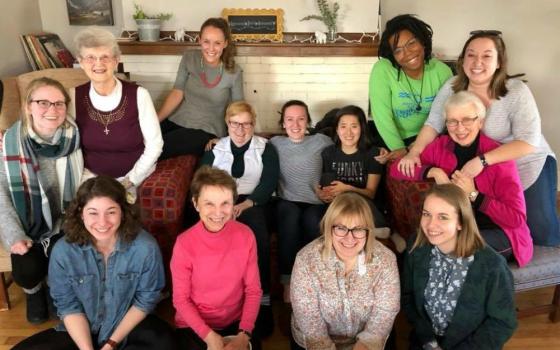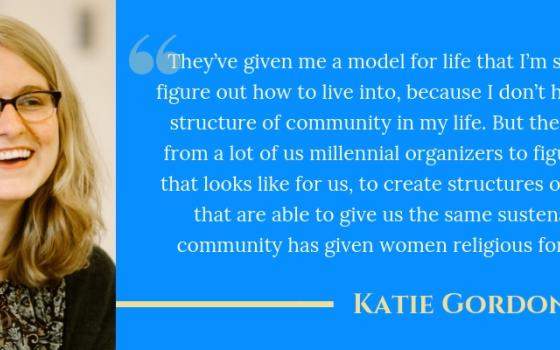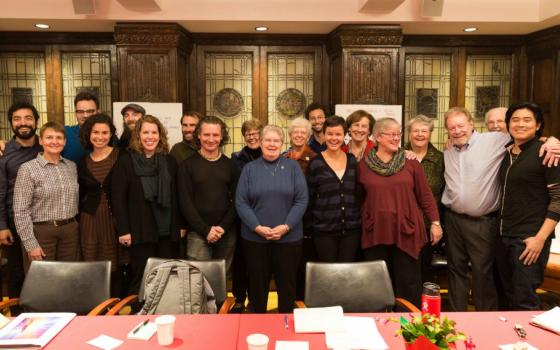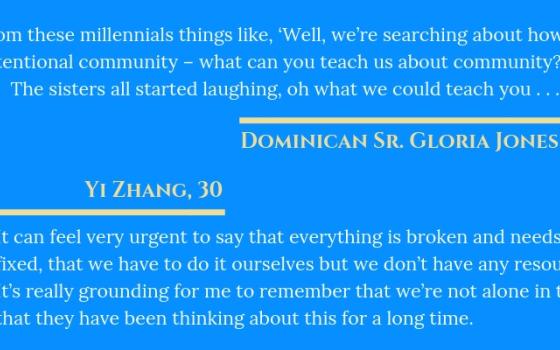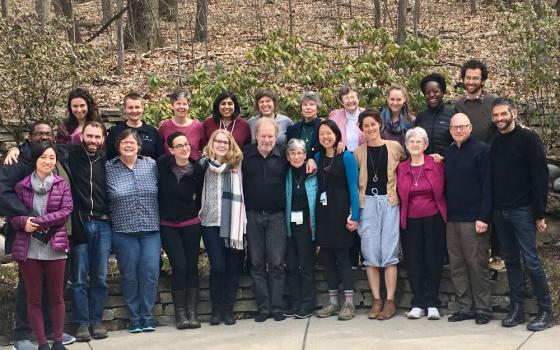Editor's note: In Part 1 of this series, Global Sisters Report focuses on the coming together of experienced Catholic sisters and young people identifying as "nones" — shorthand for the box they check next to religion. Women religious and millennials seeking meaning have become partners through a shared passion for social justice issues, community life, and their devotion to a greater purpose. These two groups have found that they are "more alike than not."
______
As a college student in Michigan, Katie Gordon began exploring atheism and agnosticism, despite being raised Catholic. But a trip to Northern India awakened in her a new appreciation for spirituality.
After graduating with degrees in religious studies and political science, Gordon (then in her early 20s) spent four years in interfaith organizing hoping to learn firsthand from the faithful how to build a similar community for the nonreligious. She could see clearly what they had that she was missing: "the gift of intentional, meaningful community."
A few years later, Gordon read that women religious were in the process of selling their oversized properties, prompting her to write a column for the Grand Rapids Press in Michigan in early 2017. She suggested that nonreligious millennials (those in their 20s to mid-30s) ought to be consulted — not just around their own needs for community space, but so that their perspectives could be heard within religious institutions as well. This idea at the time, she said, "felt like a stretch."
To Gordon's surprise, a Dominican sister in the area responded by saying she'd be delighted to be in conversation with "nones" (shorthand for those who don't practice a particular religion).
Mutual friends eventually introduced Gordon to two men from the Southwest who had a similar idea of uniting millennials and sisters, and who hosted what is considered the first national Nuns and Nones gathering in November 2016. By spring of 2017, Gordon's local efforts converged with their national movement.
Since then, Nuns and Nones has grown into regular in-person conversations and monthly conference calls, and now to a handful of millennials living with sisters in California for a six-month pilot program.
About a third of millennials are "nones." As that number swells, women religious in the U.S. are experiencing a mirror dynamic, with more Catholic sisters who are older than 90 than are younger than 60.
But while those figures indicate change in consecrated life, what drives the "nones" reminds sisters of their younger selves — a passion for social justice, desire for authentic community, hunger for contemplative practice, and a willingness to devote their lives to a greater purpose. Since witnessing that overlap, many sisters have become inspired for the future of religious life.
"In some ways I see them as the modern religious congregation," said Sr. Mary Dacey, a Sister of St. Joseph of Philadelphia and former president of the Leadership Conference of Women Religious. "Certainly not the same, but the basics and the desires are there."
The millennials involved, however, don't all identify with "none," which tends to suggest practicing no religion at all. The spectrum of millennials, people born 1981-96, can range from Christian to atheist, leading some groups to prefer calling themselves Sisters and Seekers instead of Nuns and Nones.
Sisters who spoke to Global Sisters Report see this growing movement as a tweaked continuation of their congregations' founding missions "to respond to critical human need," as Dominican Sr. Gloria Jones in Burlingame, California, put it. Though that undertaking used to revolve around social needs (education, hospitals, orphanages, etc.), "today the critical human need is related to community, to a spiritual quest, to finding meaning," she said.
"With Nuns and Nones, it's almost like the Spirit creating a new possibility for us as women religious, almost a re-founding," she said, an experience that has released in her a "new consciousness" around how women religious can "contribute to this moment, how we can make a difference in ways that are not bound by institutions or certain ages, but is fundamentally shaped by relationship."
Between local and national gatherings, plus digital meetups, Nuns and Nones has engaged more than 100 millennials and 300 sisters from more than 30 different communities. This past year alone, the group has received dozens of inquiries around forming groups, with eight more people asking about long-term residencies with sister communities.
The initial idea
Shortly after 31-year-old Adam Horowitz met Wayne Muller, a Presbyterian minister and psychotherapist, the two took regular walks around their neighborhood in Santa Fe, New Mexico, at one point talking about how they felt their community was missing "ubiquitous places of welcome and belonging," Horowitz said.
Muller recalled the old YMCA model, where one could easily get a room after arriving in a new town. With sisters running properties too big for their needs, he thought, why not turn motherhouses and convents into this type of gathering place, one that also offered mentorship?
"I knew that the sisters were not that unlike the millennials, in that they were much more horizontal than vertical in their understanding of organizational structure," said Muller, who, despite not being Catholic, has several friendships with Catholic sisters and has worked with Maryknolls in Latin America while studying liberation theology in the 1980s.
"They tend to prefer to stay closer to the ground, work on the margins of unmet needs," and are drawn to similar social issues, such as immigration, anti-poverty, and anti-racism efforts, he said. Muller knew that millennial "nones" didn't know just how effective sisters are in these ministries; likewise, sisters probably had no idea that so many millennials were also yearning for deep, authentic community and spiritual outlets.
"I knew there was a lot more similarity there than either of them could suspect about the other," said Muller, who attended Harvard Divinity School in Cambridge, Massachusetts, more than 30 years ago.
Despite never having met a sister at that point, Horowitz said he was "totally ready to jump in" with this idea. Muller then called a few sisters he knew while Horowitz reached out to fellow millennials, eventually convening the first Nuns and Nones gathering at Harvard Divinity School in November 2016, later combining Gordon's efforts in Grand Rapids. (Gordon is currently pursuing a master's in Theological Studies at Harvard Divinity School.)
"It has totally rocked my world and been one of the strongest senses of flow and calling I've ever experienced," Horowitz said of spending time with sisters.
Muller said that from the beginning, he hoped the movement would spread "in whatever way it needed to."
"Each one would have its own flavor and history and understanding of what was needed and how to do it," with everyone feeling grounded "in the same essential ways of understanding how the world works and how we work in it," he said.
First impressions
When St. Joseph of Philadelphia Sr. Carol Zinn read the invitation to the Massachusetts Nuns and Nones gathering, she knew right away it was something "worth paying attention to," she said. Zinn was named executive director for LCWR last year.
Sharing the invitation with other sisters, she could tell there was "something to this because people were responding immediately and saying [they'll] make it possible to be [at the Harvard gathering]."
"In retrospect, I would say what we were resonating with was some impulse of the Spirit prompting this. We had no idea that it was going to grow into anything beyond one conversation."
The idea behind that first gathering, Muller said, was for it to be small enough to allow time and intimacy, yet large enough to have an impact, settling on about 20 participants. Ahead of that weekend, participants shared their biographies with one another, revealing their commonalities even before meeting: The millennials ran nonprofits and cooperatives fueled by social and economic justice, while sisters shared their life's work devoted to ministries in similar fields.
"When they got in the room with each other, it took about 20 seconds to realize they were — if not completely in love with each other — certainly ready to trust and listen and be very curious," Muller said, joking that it's essentially "Nuns and Nones and Wayne." (His role has evolved into helping groups set up wherever there's interest, stepping back as they each take off.)
From her experience in Grand Rapids, 27-year-old Gordon said sisters were "the first people I met and talked with who I felt never asked me to be anything other than what I was."
"When they asked me about my belief or values, and I shared I had this complicated relationship with Catholicism, there was no judgment at all and in fact a great deal of understanding," she said. "That felt like such an opening for conversation, one of the many things that led to the creation of what became Nuns and Nones in Grand Rapids."
Jones, the Dominican sister from California, said she was moved to feel the energy that the millennials poured into social justice issues and "their desire to make a difference, "to find another way of living in this world of ours."
"We as sisters have been looking more and more at how to get more connected with the younger generation, and here they were, dropped into our present space saying, 'We want to learn from you, connect with you, walk with you.' It really did blow my mind."
Feedback and evolution
Though organized entirely by volunteers, Nuns and Nones has already made its way into the lexicon of women religious in the United States in just a couple years, even mentioned in the 2018 LCWR presidential speech by Teresa Maya, a Sister of Charity of the Incarnate Word, as an example of intergenerational conversations that are critical today.
"It's been amazing to have this much impact in such a quick time with barely any funding at all," Muller said, with gatherings in 10 cities across the country. Every week brings a new round of emails from sisters, wondering how they can get in touch with the millennials in their area.
"From the most institutional sisters to the most radically odd millennials and everybody in between, volunteering their time and seeing something of themselves in this — that's a good sign that it's probably a good idea."
Following the first meeting was an open-ended commitment to meet again, with nobody sure where the conversations would take them. Soon came monthly calls, connecting participants across the country to engage in conversation on rotating topics.
Jones described the experience as a mutual exchange, that while the millennials express gratitude for the sisters' wisdom and experiences, "they've kind of given me new eyes to see my life, our life, and the gift of it in a whole new dimension."
"But I also keep having this feeling like, I need to see through your eyes, and I want to be stretched to be able to experience what it is that is shaping their vision and commitment and searching and deepest desires, because it's incredibly sacred and beautiful. For me it's the Spirit manifesting itself in whole new ways."
Participants see this is a "mutual ministry," Horowitz said, one of spiritual accompaniment and like "a moral leadership laboratory." Today the "laboratory" has grown far beyond scheduled conversations, with millennials now living alongside sisters in the Mercy Center in Burlingame, California — a six-month experiment that began in November.
"It's a wild-sounding headline that really invites conversation," said Horowitz, one of the millennials currently living in the Mercy Center. "There's a lot of hope in this story, that groups seemingly so different are increasingly making these bids toward deepening relationships, and people have been finding that really inspiring."
His counterpart in the Midwest says something divine was at work. "The Spirit was alive and inspiring both of these separate but aligned projects, and then we were bought together to connect," Gordon said. "The spirit-led nature of this initiative feels undeniable."
"We all sensed a hunger and a potential of these two groups of humans coming together, and thankfully we all found each other as well."
[Soli Salgado is a staff writer for Global Sisters Report. Follow her on Twitter @soli_salgado. Her email address is ssalgado@ncronline.org.]
Part Two of "Nuns and Nones" coming Feb. 7 on GSR: A modern religious community
To stay posted on opportunities and developments from Nuns and Nones, you can visit their website nunsandnones.org to connect or sign up for their newsletter.
